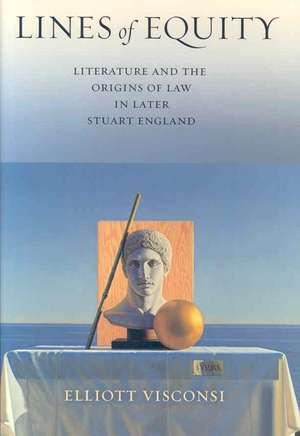Lines of Equity – Literature and the Origins of Law in Later Stuart England
Autor Elliott Visconsien Limba Engleză Hardback – 14 mai 2008
In their writings, they considered the nature of government, the extent of the rule of law, and the duties of sovereign and subject. They asked their audience to think like kings and judges: through the literary education of the individual conscience, the barbarous tendencies of the English people might be effectively banished. Visconsi calls this fictionalizing program "imaginative originalism," and demonstrates the often unintended consequences of this literary enterprise.
By inviting the English people to practice equity as a habit of thought, a work such as Milton's Paradise Lost helped bring into being a mode of individual conduct--the rights-bearing deliberative subject--at the heart of political liberalism. Visconsi offers an original view of this transitional moment that will appeal to anyone interested in the cultural history of law and citizenship, the idea of legal origins in the early modern period, and the literary history of later Stuart England.
Preț: 444.35 lei
Nou
Puncte Express: 667
Preț estimativ în valută:
85.04€ • 88.45$ • 70.20£
85.04€ • 88.45$ • 70.20£
Carte tipărită la comandă
Livrare economică 14-28 aprilie
Preluare comenzi: 021 569.72.76
Specificații
ISBN-13: 9780801446726
ISBN-10: 0801446724
Pagini: 232
Dimensiuni: 178 x 224 x 19 mm
Greutate: 0.45 kg
Editura: MB – Cornell University Press
ISBN-10: 0801446724
Pagini: 232
Dimensiuni: 178 x 224 x 19 mm
Greutate: 0.45 kg
Editura: MB – Cornell University Press
Descriere
Confronted by a public that seemed to be sunk in barbarism and violence, English writers including John Milton, John Dryden, and Aphra Behn imagined serious literature as an instrument for change.
